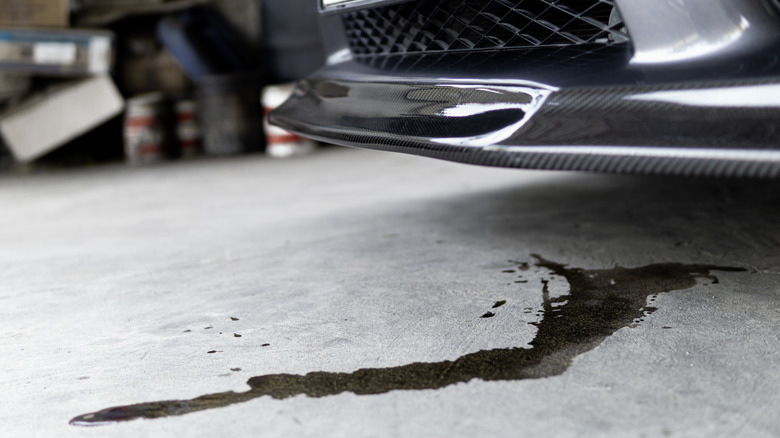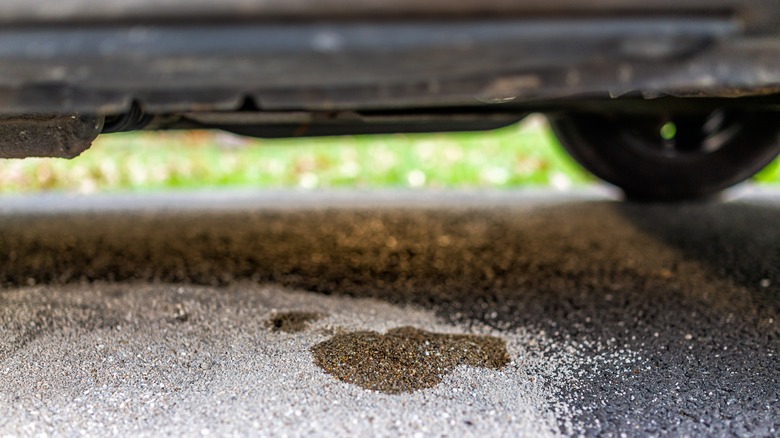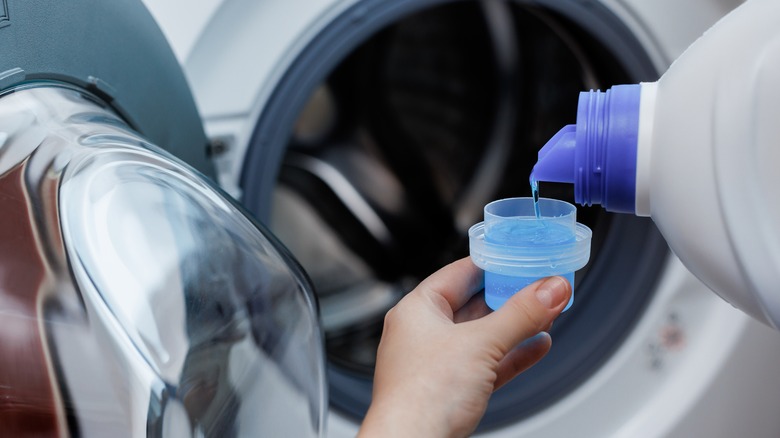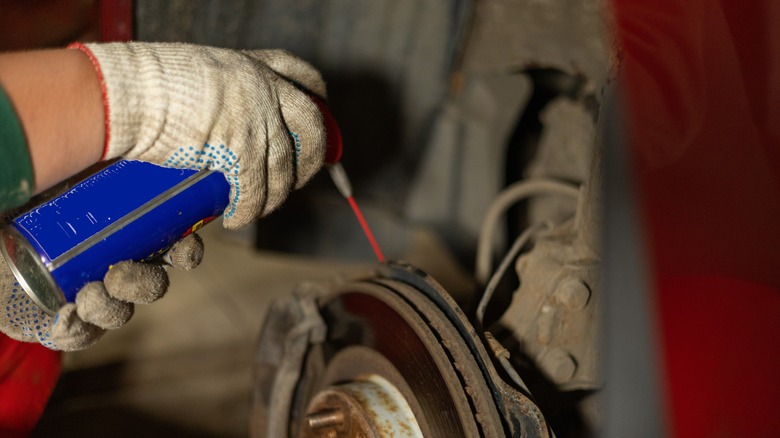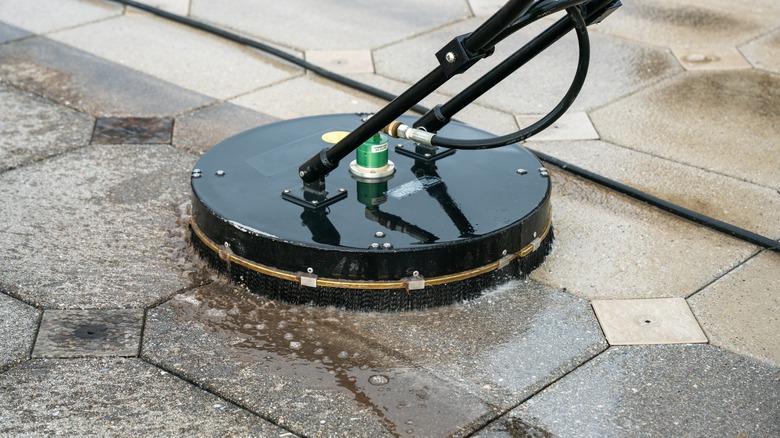5 Ways To Remove Oil Stains From Your Driveway
Oil stains can be an unseemly sight at home that should be cleaned as soon as possible. They're increasingly more difficult to remove if you leave them for too long, becoming a permanent fixture of your house. Sometimes, they're unavoidable, but the best way to prevent them is to ensure your vehicle is up-to-date on maintenance and no leaks are coming from it.
If you want to take additional precautions after an oil change, consider parking over a tarp, on cardboard, or on the street. There are a variety of substances in your car that can leave a stain besides oil, however. Gasoline is a common culprit, but so is transmission fluid. A stain from transmission fluid will be red in appearance, which is good to know when you bring your car into the shop. Luckily, there are a number of solutions in case there's a spill or leak. Most of which can be taken care of with simple household products that you likely already own.
While some products are harmless to the environment, others contain chemicals that require proper disposal. Oil-soaked rags need to be taken to a recycling or hazardous waste center. State and local authorities regulate the disposal of household hazardous waste, so check there before tossing out anything. Additionally, if you value your lawn, avoid letting any chemicals from rinsing seep into the grass.
Baking soda and cat litter
If you or a neighbor have any feline companions in the house, you don't have to invest too much into this simple method for cleaning your driveway since it only requires a couple of household products. If an oil spill happens, grab a box of clay-based cat litter and cover the spill thoroughly. For a small spill, let the litter sit for 30 minutes, or an hour for larger spills, as it absorbs the oil and prevents a huge mess. Cornstarch is a suitable substitute if you don't have cat litter readily available.
Once the required time has passed, sweep up the litter and place it in a trash bag. There will likely still be an oil stain, but the litter minimizes the damage. Now that the excess oil has been removed, it's time to use that baking soda you have sitting in your kitchen. Baking soda is a mild alkali that effectively dissolves grease, making it the perfect combatant against an oil stain.
Mix it with water to create a paste that you can easily apply to a driveway stain. Scrub it in with a brush. Once it has been thoroughly scrubbed in and your arm feels ready to fall off, simply rinse it off with water from your garden hose.
Laundry detergent
Another household product that makes it easy to remove an oil stain from the driveway is a more commonly used product. Laundry detergent, whether powdered or liquid, contains grease and oil-fighting properties. While its typically used for clothing and fabric, it works just as diligently on concrete, as well. If you use powdered detergent, you're going to mix it with warm water to create a paste, whereas liquid detergent can be applied directly to the stain.
If you go the paste route with powdered detergent and water, use a stiff-bristled brush and scrub it into the stain for two minutes. Once the entire stain has been scrubbed, let it sit for 15 minutes before taking the brush to it again for a minute, then rinse it with water. Using liquid detergent isn't much different, except you don't need to mix it with water. Pour the detergent over a stain, scrub it with a stiff-bristled brush, and then let it sit for an hour before rinsing with water.
A couple of kitchen products
Look no further than the kitchen for something to help with oil stains. Oven cleaner is designed to break down baked-on grease, which can have a similar effect on oil. So, that driveway stain that's been bothering you for months doesn't stand a chance.
Spray the oven cleaner over the stain and let it sit for 10 to 15 minutes. When your timer goes off, scrub the stain with a stiff-bristled brush. Rinse with warm water and repeat the whole process until the stain is completely gone. If the oven cleaner isn't working, there's one other item in the kitchen potent enough for the driveway: Dish soap.
Dish soap uses the emulsification process to essentially become one with the oil particulates and then lift it from the surface. Spread some dish soap around the afflicted area with a heavy-duty brush and rinse away with water. It could take a couple of tries before the stain dissipates completely. For that extra "oomph," a power washer can work better than a hose when rinsing.
WD-40
There are a number of WD-40 hacks you'll wish you knew sooner. It's not only for lubricating door hinges or protecting metal from corrosion. It can clean an oil stain on your driveway without damaging the concrete or asphalt, as well. Before using WD-40 on your driveway, make sure any excess oil has already been absorbed and removed with cat litter, saw dust, cornstarch, or even baking soda.
Once you only have the stain to deal with, spray the entirety of it with WD-40. When you've thoroughly covered the stain, grab yourself a thick-bristled brush and get to scrubbing. The WD-40 will loosen and dissolve the oil remnants from your driveway.
When there's no sign that oil ever blanketed the area, thanks to the magical properties of the multi-purpose spray, use a hose and rinse the area with water. You can use cat litter or one of the other many absorbent products to soak up the remaining moisture. Once that's cleaned up, your driveway will be stain-free.
Zep cleaner and a power washer
If no other solution works, it's time to break out the big guns. TikTok's favorite cleaner works wonders on your driveway and shouldn't be dismissed prematurely. Sometimes, TikTok users have genius ideas. The Zep Driveway & Concrete Cleaner is ideal for oil stains, as it can remove a variety of blemishes from any concrete surface. Arm yourself with the Zep cleaner and a Ryobi pressure washer, which is great for chores around the house, and oil stains won't stand a chance. Your driveway will look as good as new.
If you're cleaning a light or relatively fresh stain, simply dilute six ounces of the cleaner per gallon of hot water. For more intensive stains, increase the ratio to 12 ounces of cleaner per gallon of water. The hotter the water, the easier it is for the oil to dissolve. Scrub the stained area with a brush before using a pressure washer. If you don't have access to a pressure washer, an everyday garden hose will work just as well.
While the cleaner is intended to be diluted, if a stain is too difficult to remove, using the cleaner at full strength might be the way to go. Be sure you follow the manufacturer's instructions for proper usage.
